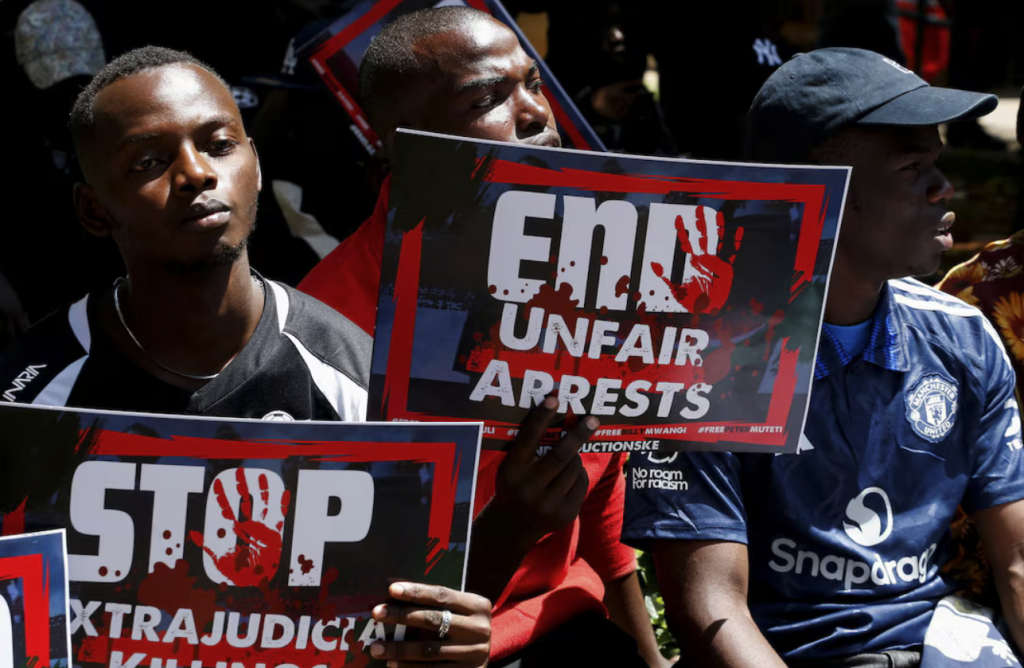Tensions flared in Kenya’s capital on Monday as police fired teargas to disperse protesters demonstrating against what they describe as a surge in unexplained abductions of government critics. The protests, which saw dozens of Kenyans take to the streets of downtown Nairobi, highlight growing concerns over human rights violations and the shrinking space for dissent in the East African nation.
Human rights groups have reported that dozens of Kenyans have been abducted in recent months, with many blaming the country’s police and intelligence services for these extrajudicial arrests. These allegations have sparked widespread outrage, particularly among young activists and opposition figures who accuse the government of silencing dissent through intimidation and unlawful detentions.
“We are here to demand accountability,” said one protester, who preferred to remain anonymous for fear of reprisal. “People are disappearing, and no one is telling us why or where they are. This is not the Kenya we fought for.”
The Kenyan government has denied these accusations, stating that it does not condone or engage in extrajudicial killings or abductions. However, the lack of transparency and accountability in these cases has only fueled public skepticism.
Monday’s demonstrations saw a mix of marches and sit-ins, with protesters chanting slogans against the government and holding placards denouncing illegal detentions. Among the demonstrators was Busia Senator Okiya Omtatah, a prominent opposition lawmaker known for his activism. Omtatah and other protesters used thick chains to link themselves together in a symbolic act of resistance as riot police attempted to break them apart.
The scene was chaotic, with clouds of teargas hanging in the air and police on horseback patrolling the area. According to the *Daily Nation*, Omtatah and at least 10 other protesters were detained during the protests.
The alleged abductions follow months of anti-government protests that began in June 2024. Initially sparked by proposed tax hikes, the demonstrations quickly evolved into a broader movement challenging President William Ruto’s administration. What started as a response to economic grievances has grown into a cross-ethnic coalition demanding greater accountability, transparency, and respect for human rights.
This movement represents one of the most significant challenges to Ruto’s presidency since he took office in 2022. Analysts say the protests have tapped into widespread frustration over corruption, economic inequality, and perceived authoritarian tendencies within the government.
According to data from human rights organizations, at least 50 Kenyans have been abducted or forcibly disappeared in the past six months. Many of these individuals are activists, journalists, or opposition supporters who have been critical of the government.
“The pattern is clear,” said a spokesperson for Amnesty International Kenya. “Those who speak out against the government are being targeted. This is a blatant violation of human rights and a threat to democracy.”
Research by local NGOs suggests that these abductions are often carried out by plainclothes officers in unmarked vehicles, making it difficult to hold anyone accountable. Families of the victims are left in the dark, with no information about their loved ones’ whereabouts or well-being.
Senator Omtatah, who was briefly detained during Monday’s protests, spoke to reporters after his release. “This is not just about me or the other protesters,” he said. “This is about the future of our country. If we allow these abductions to continue, we are paving the way for a dictatorship.”
Another protester, a young woman who identified herself only as Mary, echoed these sentiments. “We are tired of living in fear,” she said. “We want to know that our voices matter, that our lives matter.”
Despite the growing outcry, Kenyan authorities have remained largely silent on the issue. Nairobi police commander Adamson Bungei and national police spokesperson Rosalia Onyango did not respond to requests for comment from Reuters or other media outlets.
This lack of communication has only deepened public distrust. “When the government refuses to address these allegations, it sends a message that they have something to hide,” said political analyst Michael Mwangi.
As the protests continue, the question on many Kenyans’ minds is: what happens next? Will the government take steps to address these allegations and restore public trust, or will the crackdown intensify?
For now, the demonstrators remain defiant. “We will not be silenced,” said one protester. “This is our country, and we will fight for it.”
The situation in Kenya serves as a stark reminder of the fragility of democracy and the importance of safeguarding human rights. As the world watches, the hope is that dialogue and accountability will prevail over repression and fear.
